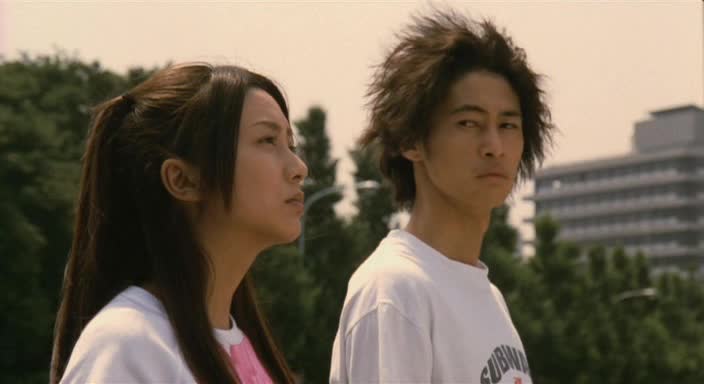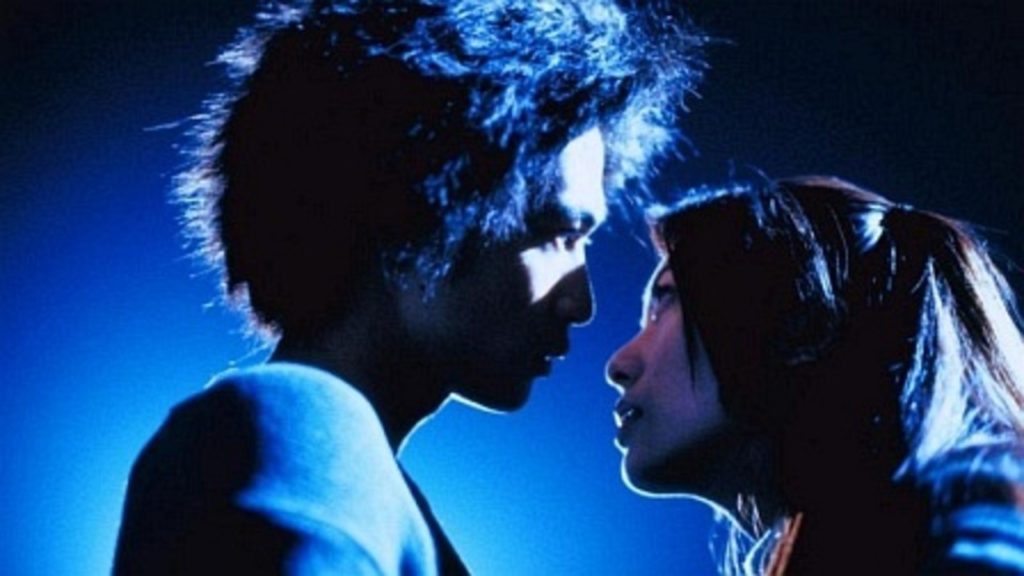Isao Yukisada’s Go
June 22, 2023 · 0 comments
By Tom Wilmot.

What is nationality? That is the question at the heart of Go (2001), Isao Yukisada’s award-winning film adapted from Kazuki Kaneshiro’s 2000 novel of the same name. The movie explores the endlessly complex subject of nationality and ethnic belonging, via a coming-of-age story sprinkled with romance. A critical and box office success in its native Japan, Go is back in the conversation, having received a global Blu-ray debut through Third Window Films. Provocative, sincere, and filled with memorable performances, Yukisada’s film remains pertinent in its assessment of nationality-based discrimination over twenty years later.
With his wild hair and bad-boy attitude, Sugihara (Yosuke Kubozuka) is indistinguishable from his high school peers. However, this teen is a social outcast; as a Korean-Japanese, he’s treated as no more than a temporary resident of Japan – a so-called “zainichi”. Born to Korean parents, Sugihara has never felt welcome in his birth country, nor has he ever visited his fatherland. With no place to truly call home, the high schooler’s path to a brighter future is made even more uncertain when he meets the Japanese-born Sakurai (Ko Shibasaki) and falls for her head-over-heels.
Sugihara’s struggle as a Korean living in Japan is the central focus of Go. Targeted by the Japanese authorities and fellow students alike, it’s no wonder the late-teen adopts a jaded rebel persona. For Sugihara and his former junior school classmates, there’s a clear ‘us vs them’ mindset between Korean residents and the native Japanese. While this siege mentality unifies the Koreans, it isolates them further from an already prejudiced society. When Sugihara breaks the mould by enrolling in a Japanese high school, he’s immediately targeted by his new peers and viewed as a traitor by his Korean compatriots.

Sugihara embraces a cold and intimidating exterior as a means of self-protection, but he’s a romantic at heart, curious about the music, literature, and films of other countries – just not Japan’s. His closest friend and fellow zainichi, Jeong-il (Takahito Hosoyamada), lends him books and tapes that transport him to worlds far away from the lonely archipelago. Only after meeting Sakurai does Sugihara’s softer side shine through, the charming girl setting him at ease with her confidence. The only thing in his mind that could ruin this new relationship and force him back into a hard, impenetrable shell is if Sakurai were to discover his nationality. Would it matter to her that he’s Korean, or would it tear them apart? Such a concern should be dismissed as silly, but the unfortunate truth is that in Sugihara’s world, nationality matters.
It never feels as though Sugihara’s zainichi status is the overbearing focus of the film, as we spend so much time exploring his daily life and relationships. However, our protagonist’s nationality is always lurking beneath every interaction, informing almost all aspects of his character. Perhaps it’s the point of the film that neither Sugihara nor any other resident alien’s nationality needs to come to the fore, as it will end up defining them regardless in a discriminatory country.

Kazuki Kaneshiro’s novel deals with Sugihara’s nationality in a more direct and intimate manner. A zainichi-Korean himself, the author knows better than most the discrimination that faces foreign temporary residents in Japan. It’s not untoward to assume that the bullying, social anxieties, and identity questions that Sugihara endures were similar to those experienced by the Kawaguchi-born writer. Written from Sugihara’s perspective, the novel captures his inner turmoil concerning his national status. In a moment omitted from the film, the high schooler viciously beats down a nightclub troublemaker, playing up to his thorny zainichi image in public whilst quietly condemning his violent actions within.
Of course, not all of Go is centred on Sugihara’s nationality struggles, as his narration reminds us more than once that this is a love story. Strip away the zainichi element, and the film still presents a solid coming-of-age drama about young love and finding your place in the world. The relationship between Sugihara and the sweet Sakurai is mostly light-hearted and playful, as the pair share their world views and interests, all whilst hiding their given names from one another. Similarly, Sugihara’s friendships with his countrymen are quite touching, particularly that with the well-meaning Jeong-il, who’s at the centre of the film’s most sobering narrative gut punch.

Rather than opt for a by-the-numbers adaptation, director Isao Yukisada injects as much energy as possible into the film’s two-hour runtime. The blistering opening credits sequence is typical of the early-2000s in everything from the eye-popping graphics to the high-octane soundtrack. Yukisada frequently employs jump cuts to maintain a level of energy that matches Sugihara’s explosive personality. The director also maximises the cinematic potential of several moments from Kaneshiro’s novel, the most notable being Sugihara’s late-night boxing showdown in the park. Some of the book’s tenderer moments are also done justice; Sugihara and Sakurai’s frank hotel conversation captures all the awkwardness and angst of the novel, marking one of the film’s most engrossing scenes.
Along with its lively filmmaking style and enlightening social observations, Go is also blessed with an all-star cast. The romantic leads are sure to be familiar to many viewers; Ko Shibasaki, having starred as the sneering Mitsuko in Kinji Fukasaku’s iconic Battle Royale, and Yosuke Kubozuka, who has since gone on to collaborate with Toshiaki Toyoda and Martin Scorsese. The supporting players aren’t too shabby either, with Shinobu Otake (The House of the Lost on the Cape), Kanji Tsuda (Onoda), and the prolific Tsutomu Yamazaki all making appearances. Yamazaki threatens to steal the show as Sugihara’s strong-jawed father, Hideyoshi, bringing a welcome sense of humour to a character that could have quite easily been a stern, grizzled stereotype.
A deftly crafted coming-of-age drama, Go still packs a powerful punch over two decades later. The subtlety with which Isao Yukisada handles the central theme means that the movie has aged beautifully in a modern cinematic landscape that often sees social critiques take precedence over narrative. The film is another fantastic piece of early noughties Japanese cinema that is ripe for re-visiting via Third Window Films’ new release.
Go is released in the UK by Third Window.
Leave a Reply